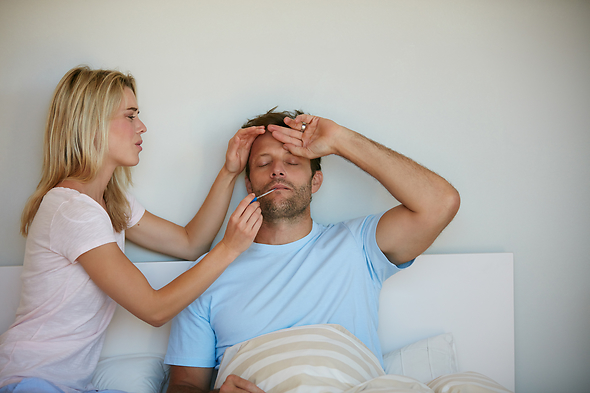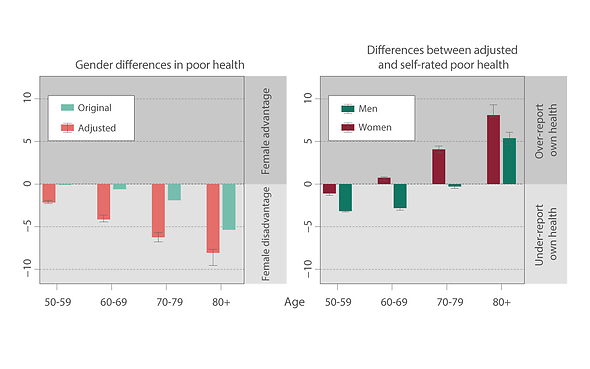July 09, 2019 | News | New Publication
Study examines whether men and women rate their health differently

© laflor/ iStockphoto.com
A common cliché suggests that men are tough guys but whine about small aches and pains. Then again, researchers frequently find that women rate their health more poorly and consult a doctor more often than men. So, which gender is more sensitive to health problems? A new study explores this question.
The following text is based on the original paper Is the story about sensitive women and stoical men true? Gender differences in health after adjustment for reporting behavior by MPIDR researcher Anna Oksuzyan, and a German version with minor changes has also been published in the issue 2/2019 of the demographic quarterly Demografische Forschung Aus Erster Hand.)
Anna Oksuzyan and her colleagues at the Max Planck Institute for Demographic Research in Rostock compared men and women’s perceptions of their health using data from 12 European countries in the Survey of Health, Ageing and Retirement in Europe (SHARE). The survey inter alia asked respondents to assess their own general health and then translate their ratings onto a 5-point scale, with responses ranging from “very bad” to “very good”.
The answers show that women perceive their health to be poorer than do men (see Fig 1). As expected, the prevalence of self-reported poor health increases with age among both men and women. A mere 5.9% of women aged 50–59 rate their health as poor, compared to more than 20% of females aged 80+. Among men, the share rises from 5.7% in the youngest age group to 15.5% in the oldest age group. The gender difference in poor self-rated health thus widens with age, from 0.2% in the youngest to almost 5% in the oldest group.
But are self-reports true reflections of respondents’ health? Or do specific socio-demographic groups, such as the elderly, women, and academics, over-report or downplay their health problems? To tackle this question, Anna Oksuzyan and her colleagues looked to additional survey information on specific physician-diagnosed conditions, other medical conditions, and general physical fitness. A total of 21 different health measures were examined, ranging from Parkinson's to respiratory diseases, depression, hypertension and overweight.

The difference between men and women is much larger in adjusted health than in the original self-rated health. It is thus not true that women are more sensitive or complain more easily about their health problems. Source: SHARE, own calculations © Graphic: MPIDR
Using this additional, detailed health data, the researchers first constructed an ideal state of health. They then calculated the extent to which the different diseases or physical difficulties contribute to lower scores in this ideal health measure. For example, Parkinson's, poor mobility, and experiencing a heart attack or a stroke have effects that are especially detrimental to overall health. Incorporating the data on respondents’ individual health problems and how much these problems contribute to overall health states, the scientists then created estimates of respondents’ “true” health. These values were recoded into five categories, again ranging from “very good” to “very bad” to allow for comparisons with the respondents’ own perceptions.
Comparisons between the self-rated and adjusted values show that women are not more sensitive to their health problems and do not exaggerate their health woes. On the contrary, gender differences in the adjusted values are larger than they are in the original ratings of the respondents, especially among the younger age groups (see Fig. 1).
At the same time, reporting patters are very similar for the two genders when looking across the age groups. Both women and men aged 50-59 over-stated poor health, but older people, most notably those aged 80+, perceived their health to be much better than their underlying diseases and other medical conditions would suggest. Findings are similar among respondents who evaluated their health to be good. The share of younger people who report good health is lower than indicated by the data on underlying morbidity, while older respondents overstate good health irrespective of gender.
The study thus does not support stereotypical expectations that women’s poorer health ratings are the result of them over-reporting poor health or being more sensitive to health problems. Rather, it challenges the prevailing gender-stereotypical expectation that “sensitive” women exaggerate their health problems and “stoical” men tend not to mention them. The study authors call upon researchers and physicians to refrain from stereotypical expectations about gender and to attend to health problems reported by women and men with equal care.
Co-author of the scientific study: Anna Oksuzyan
Scientific article: Oksuzyan, A., M. J. Dańko, J. Caputo, D. Jasilionis and V.M. Shkolnikov: Is the story about sensitive women and stoical men true? Gender differences in health after adjustment for reporting behavior. Social Science and Medicine 228(2019), 41-50.DOI: 10.1016/j.socscimed.2019.03.002